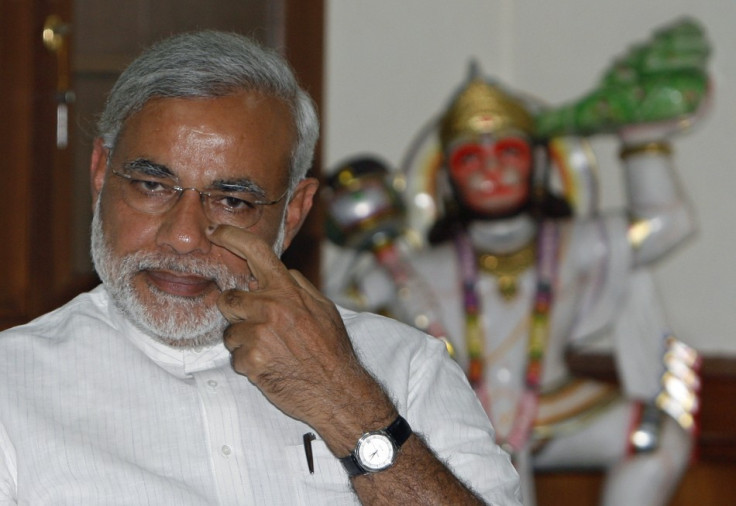India Elections 2014: Who is Narendra Damodardas Modi, India's Next Prime Minister?

Narendra Damodardas Modi, hard-line Hindu nationalist, controversial legislator, fire-brand orator and organiser par excellence, will be at the helm of the world's largest democracy for the next five years.
Emerging results of India's mammoth general elections show the right-wing Bhartiya Janata Party (BJP) getting home with a thumping majority.
Modi, undoubtedly one of the most controversial political figures in India's post-independence era, is all set to pilot the country with a wide range of promises. This is in the backdrop of India's grand-old Indian National Congress party crumbling under allegations of large-scale corruption and downright mismanagement of the economy.
India's would-be prime minister, Modi, was born on 17 September, 1950 into a low-profile Gujarati family. At a very young age, he began helping his father Damodardas Mulchand Modi sell tea at bus and train stations – a pursuit he often cites, in political campaigns as well as interviews, to highlight his humble beginnings.
His personality has been shaped by the Rashtriya Swayamsevak Sangh (RSS), the ideological parent of the BJP, which he joined when he was barely eight. The RSS technically remains an apolitical social outfit but wields enormous influence over the BJP.
The meteoric rise of Modi within the ranks of the RSS, however, began during the emergency rule under Congress' Indira Gandhi in 1975-77 and as the adage, or some say the cliché, goes there was no looking back for Modi.
The RSS bequeathed Modi to the BJP in 1985, the formative years of the party itself.
With his inimitable administrative style and organisational skills, he went on to become the chief minister of Gujarat in October 2001, capitalising on the wide network he had established in his own party through the years.
In 2002, his handling - or as his critics call it - the mishandling of the infamous Gujarat riots which killed more than 1,000 people, mostly Muslims, put him the negative spotlight. He has come under relentless scrutiny since then. Modi's anti-Muslim image has stuck and his name has become synonymous with anti-Islam sentiments.
Controversy has dogged his personal life as well. An arranged alliance to Jashodaben Chimanlal when he was just 18 did not last, as marriage did not suit the life of public service he had envisioned for himself.
His refusal to publicly acknowledge his marital status until recently - although estranged the couple have not had a formal dissolution of marriage - had also created much controversy.
Despite his harsh critics, who frequently go on to compare him with Hitler for his role in the riots, Modi won two successive elections in 2007 and 2012 and is continuing as the longest-serving chief minister of Gujarat piggybacking on the state's agenda of development.
Besides his more-than-a-decade-long rule in Gujarat, Modi also rose to the national political arena, sometimes even superseding his seniors in the party.
Even in the face of strong opposition from both within and outside the BJP, Modi was anointed as the BJP's prime ministerial candidate – a move long-predicted by analysts and much awaited by Modi's fans – in March 2013.
During the months-long zealous election campaigns, Modi had addressed hundreds of rallies across the country and held skilful negotiations with several regional political parties.
Modi's efforts have fructified as he is set to occupy India's highest democratically elected position within days of the results being announced today (16 May).
© Copyright IBTimes 2025. All rights reserved.






















